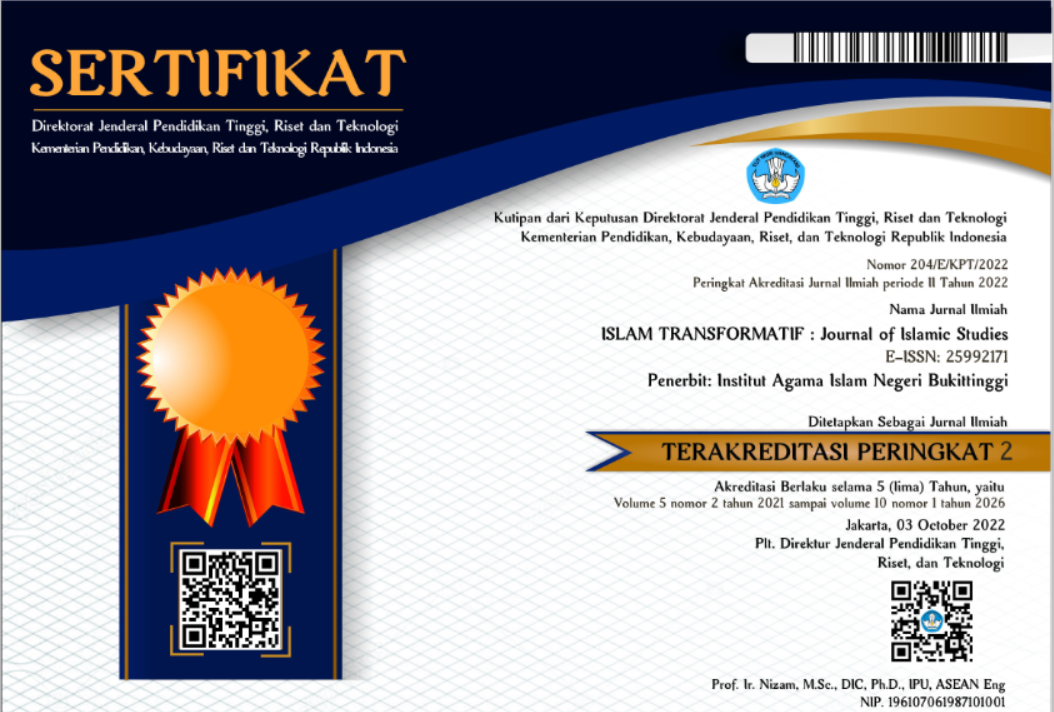The Role of Personality Psychology in Islamic Religious Education
DOI:
https://doi.org/10.30983/it.v5i1.4271Keywords:
Personality Psychology, Islamic Education, Curriculum.Abstract
References
Ahmadi, Abu. Psikologi Perkembangan. Jakarta: Rineka Cipta, 2005.
Ali, Mahrus. “3 Tips Ibnu Sina Ketika Menghadapi Krisis Kesehatan.†santrinews.com, 2021.
Alwisol. Psikologi Kepribadian. Revisi. Malang: UMM Press, 2018.
Ar.islamway.net. “التلازم بين الظاهر والباطن,†2008
Carihadis.com. “Bulughul Maram Arab Jilid 1 Halaman 575,†n.d.
Cloninger, Susan. “ConsptualIssues in Personality Theory.†In The Cambridge Handbook of Personality Psychology. New York: Cambridge University Press, n.d.
Corr, Philip J., and Gerald Matthews. The Cambridge Handbook of Personality Psychology. New York: Cambridge University Press, 2009.
Danim, Sudarwan, and H. Khairil. Psikologi Pendidikan dalam Perspektif Baru. Bandung: Bandung: Alfabeta, 2014.
Deniz, M. Engin, and Seydi Ahmet Satici. “The Relationships between Big Five Personality Traits and Subjective Vitality.†Anales de PsicologÃa 33, no. 2 (2017): 218. https://doi.org/10.6018/analesps.33.2.261911.
Epsikologi.com. “Psikologi Kepribadian: 8 Pengertian, Sejarah, Teori, Ruang Lingkup, dan Manfaatnya,†2019.
Figueredo, Aurelio Jose´, Paul Gladden, Geneva Va´squez, Pedro Sofio Abril Wolf, and Daniel Nelson Jones. “Evoltionary Theories of Personality.†In The Cambridge Handbook of Personality Psychology, edited by PhilipJ.Corr and Gerald Matthews. New York: Cambridge University Press, 2009.
Forrester, William R., Armen Tashchian, and Ted H. Shore. “Relationship Between Personality And Behavioral Intention In Student Teams.†American Journal of Business Education (AJBE) 9, no. 3 (2016): 113–18.
Hadi, Imam Anas. “Peran Penting Psikologi dalam Pendidikan Islam.†Nadwa: Jurnal Pendidikan Islam 11, no. 2 (2017): 251–68.
Hawi, Akmal. Kompetensi Guru Pendidikan Agama Islam. Jakarta: Raja Grafindo Persada, 2014.
Https://doi.org/10.19030/ajbe.v9i3.9698.
Ishom, Muhammad. “3 Tips Ibnu Sina Saat Menghadapi Krisis Kesehatan.†nuonline. Accessed July 23, 2021. https://islam.nu.or.id/post/read/118661/3-tips-ibnu-sina-saat-menghadapi-krisis-kesehatan.
Jalaluddin. Psikologi Agama. Jakarta: Raja Grafindo Persada, 2009.
Khoirina, Nella, and Anas Rohman. “Psikologi Kepribadian dalam Pendidikan di Madrasah.†Progress 6, no. 1 (2017).
Koesworo. Teori – Teori Kepribadian. Bandung: Eresco, 2001.
Mussen, Paul Henry. Perkembangan dan Kepribadian Anak. Jakarta: Arcan, 1994.
Othman, Nooraini. “A Preface to the Islamic Personality Psychology.†International Journal of Psychological Studies 8, no. 1 (2015): 20. https://doi.org/10.5539/ijps.v8n1p20.
Rosydi, Hamim. Psikologi Kepribadiian, Paradigma Traits, Kognitif, Behavioristik, dan Humanistik. Surabaya: Jaudar Press, 2015.
Sarwono, Sarlito W. Pengantar Psikologi Umum. Jakarta: Rajawali Pers, 2013.
Siregar, Maragustam. Filsafat Pendidikan Islam Menuju Pendidikan Karakter. Yogyakarta: Pascasarjana FITK UIN Sunan Kalijaga, 2020.
Sjarkawi. Pembentukan Kepribadian Anak. Jakarta: Bumi Aksara, 2008.
Suteja. Tafsir Tarbawi. Cirebon: Nurjati Press, 2012.
Tauhidiy, Abu Hayyan At. Al Basa’ir wa al Zakha’ir Juz 7. 1st ed. Beirut: Dar Sader, 1988.
Tim Kementerian Pendidikan Nasional RI. “Peraturan Menteri Pendidikan Nasional Nomor 16 Tahun 2007 Tentang Standar KualifikasiAkademik dan Kompetensi Guru.†Jakarta: PT Rineka Cipta, 2007.
Tim Penyusun. “Undang-Undang RI Nomor 14 Tahun 2005 Tentang Guru dan Dosen.†Jakarta: PT Rineka Cipta, 2005.
Wicaksana, Inu. Mereka Bilang Aku Sakit Jiwa: Refleksi Kasus-Kasus Psikiatri dan Problematika Kesehatan Jiwa Di Indonesia. Yogyakarta: Kanisius, 2008.
Wijaya, Mirza Mahbub. Filsafat Kesatuan Ilmu Pengetahuan: Unity of Sciences Sebagai Format Integrasi Keilmuan UIN Walisongo. Semarang: Fatawa Publishing, 2019.
Wijaya, Mirza Mahbub, Mahfud Junaedi, and Sholihan. “Scientific Development Based on Unity of Sciences (Waḥdat Al-‘Ulum) Paradigm.†International Journal Ihya’ ‘Ulum Al-Din 23, no. 1 (2021): 1–26.
Yusuf, Ahmad. “Dimensi Pendidikan Islam dalam Perspektif QS Surat As Sajadah Ayat 7-9.†IQRO: Journal of Islamic Education 4, no. 1 (2021): 41–59.
Downloads
Published
How to Cite
Issue
Section
Citation Check
License
Authors who publish with this journal agree to the following terms:
- Authors retain copyright and grant the journal right of first publication with the work simultaneously licensed under a Creative Commons Attribution-ShareAlike 4.0 International License that allows others to share the work with an acknowledgment of the work's authorship and initial publication in this journal.
- Authors are able to enter into separate, additional contractual arrangements for the non-exclusive distribution of the journal's published version of the work (e.g., post it to an institutional repository or publish it in a book), with an acknowledgment of its initial publication in this journal.
- Authors are permitted and encouraged to post their work online (e.g., in institutional repositories or on their website) prior to and during the submission process, as it can lead to productive exchanges, as well as earlier and greater citation of published work (See The Effect of Open Access).




